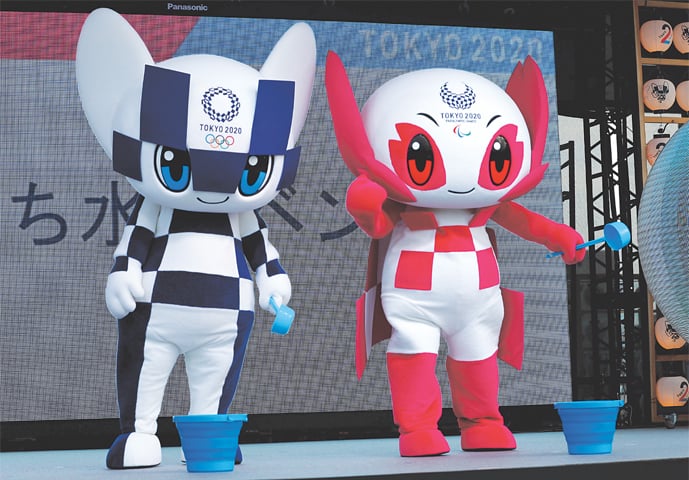
TOKYO: The 2020 Olympics will open in two years, and the heat is on. Since being awarded the games, which will be the largest ever with 33 sports and 339 events, the Tokyo organisers have had to deal with a series of setbacks ranging from stadium and construction delays, natural disasters and a mascot scandal.
It was all brought sharply into focus this week with a deadly heatwave gripping Japan as the countdown clock ticked down to two years until the July 24-Aug 9 Tokyo Olympics.
Potential for scorching summer conditions has always concerned organizers, with temperatures in central Tokyo often exceeding 35 Celsius (95 Fahrenheit) in July and August, made more difficult because of high humidity.
This summer heatwave has resulted in more than 65 deaths and sent tens of thousands to hospitals, and the temperature reached an historic high on Monday when local media reported the 41.1 Celsius (106F) was the highest recorded in Japan.
Experts have warned the risk of heatstroke in Tokyo has escalated in recent years, while noting the Olympics are expected to take place in conditions when sports activities should normally be halted.
“We are mindful that we do have to prepare for extreme heat,” John Coates, head of the IOC’s coordination commission for the Tokyo Games, told a recent news conference.
The 1964 Games in Tokyo were held in October to avoid the harshest of the heat, but that was before the Olympics schedule was influenced by rights-paying broadcasters and sponsors.
Local organisers for the 2020 Games are doing what they can to help athletes combat the conditions. The marathon and some other outside events will be held early in the morning to avoid extreme heat.
The federal and the Tokyo metropolitan governments are also planning to lay pavements that emit less surface heat and plant taller roadside trees for shade.
“The spectators as well as the athletes have to be taken care of,” Coates said. “The timing of the marathon and road walks will be as early as possible as they have been in previous games to beat the heat.”
The organisers want the games to help showcase Japan’s recovery from the 2011 earthquake and tsunami that took more than 18,000 lives and triggered meltdowns at the Fukushima nuclear power plant.
While reconstruction from the disaster is making steady progress, and work on the new 68,000-seat main stadium in Tokyo is 40 percent complete, more than 70,000 people remain displaced from their communities.
The construction of the main stadium was more than a year behind schedule when it started in December 2016, as earlier plans were scrapped because of spiraling costs and a contentious design.
The Japanese government approved the new 150 billion yen ($1.5 billion) stadium, which is expected to be completed in November of 2019. The previous construction timeline would have allowed the main stadium to host the 2019 Rugby World Cup final on Nov 2 as a test event, but that idea was scrapped.
Meanwhile, the organisers say the other newly-constructed venues are 20 to 40 percent complete.
The torch relay will start March 26, 2020, in Fukushima, an area hit hard by the disaster.
Coates said local organizers are on track with 24 months to go.
“Tokyo 2020 Games comes a significant step closer to delivering an Olympic Games that will bring Japan and the world together,” he said. “The organising committee has presented considerable progress ... especially as it related to venue and operational readiness.”
But despite fears over the searing heat and the political and financial rows that have plagued the build-up to the Olympics, Japan’s athletes can’t wait to compete at a home Games.
“There is an awful lot of work to do in the next two years obviously but I’m already getting goosebumps,” Rio Olympic swimming bronze medallist Daiya Seto said. “I’m incredibly lucky to be able to race at an Olympics in Japan — I’m determined to seize the opportunity.”
World champion climber Akiyo Noguchi vowed that nothing but the Olympic title will do for her.
“I’m sure there will be a lot of pressure as a home athlete,” said the bouldering star. “But all I’m thinking about is winning that gold medal.”
While Olympic organisers remain under pressure to come up with ways to beat the heat, Japanese athletes will not be complaining if gets a little toasty.
“We’ll be more used to the heat and humidity than many of the foreign athletes,” insisted Seto, who will aim to beat countryman and reigning Olympic champion Kosuke Hagino in the men’s 400 metres individual medley.
“When Kosuke won in Rio it lit a fire under me and with any luck it will be my turn to win gold this time,” added the two-time world champion. “Watching Japan do well at the World Cup in Russia got me even more fired up about the Olympics. A gold medal in Tokyo will have even more value, so it’s up to me to go out and win it.”
Noguchi added: “You don’t get many chances like this in life — I want to make it count. “
Published in Dawn, July 25th, 2018














































Dear visitor, the comments section is undergoing an overhaul and will return soon.